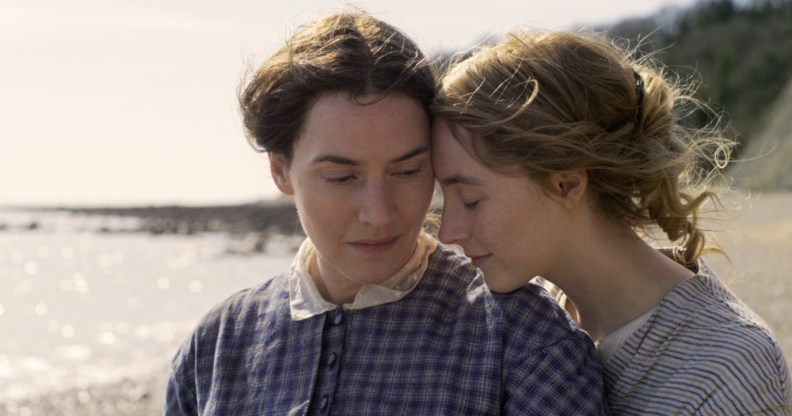Kate Winslet spent a winter digging up beaches for fossils to prepare for her role in Ammonite

Kate Winslet as Mary Anning and Saoirse Ronan as her lesbian lover in Ammonite.
Kate Winslet spent weeks walking around beaches in 19th century-style shoes to prepare for her role in Ammonite.
Winslet plays palaeontologist Mary Anning in the latest film from queer director Francis Lee – and she wasn’t afraid to put the work in to prepare for the role, she told Esquire.
The actor prepared for gruelling scenes filmed on Dorset cliff-edges and beaches by wandering along beaches during the winter of 2018 and 2019 in appalling weather wearing old-fashioned shoes.
She also learned how to dig for fossils with her fingers so she could properly capture Anning.
“I did as much as I could to feel as if I had the physicality of Mary in my bones,” Winslet told the magazine.
Francis Lee said all of Winslet’s “training” ahead of filming “leaves an imprint” on viewers when they watch Ammonite.
“As a viewer I don’t ever want be pulled out of the moment. I don’t want to be thinking, ‘Is that really Kate digging in the mud? Does she really know what she’s doing?'”
Kate Winslet film Ammonite attracted controversy upon its release
Ammonite was given a limited release last year, winning critical acclaim in the process. It is now available to stream on demand in the UK.
The film imagines Anning as queer, with Saoirse Ronan playing her lover. But Ammonite quickly attracted backlash from conservative commentators and descendants of Anning, who hit out at Lee for writing her as queer when there was no evidence that she had sexual relationships with women. There is also no evidence that Anning had relationships with men.
Lee also faced criticism from some on social media who argued that, as a queer cisgender man, he should not have made a film about a queer woman.
Speaking to Esquire, Lee said he “didn’t expect those reactions”.
“I try not to focus too much on social media but I do get the sense that this film has hit a number of red flags at this very particular point in history. And that has all been quite strange.”
The director said debates about who can tell certain stories has made things “very complicated” for storytellers.
“What does it mean? Does it mean a woman can’t make a film about a man? Does it mean a person of colour can’t make a film about white people, or a non-queer person can’t make a film about queer people or vice versa?
“That all starts to feel difficult for me, because I don’t know what we’re going to be left with. It’s really made me ask, ‘What can I make next? What am I allowed to have a voice in?'”

